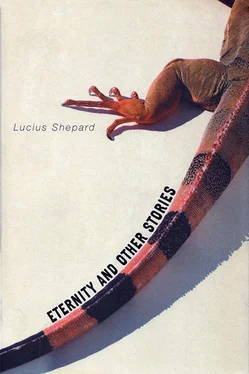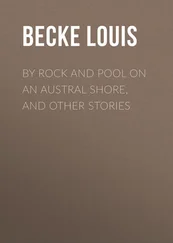Люциус Шепард - Eternity and Other Stories
Здесь есть возможность читать онлайн «Люциус Шепард - Eternity and Other Stories» весь текст электронной книги совершенно бесплатно (целиком полную версию без сокращений). В некоторых случаях можно слушать аудио, скачать через торрент в формате fb2 и присутствует краткое содержание. Город: New York, Год выпуска: 2005, ISBN: 2005, Издательство: Thunder's Mouth Press, Жанр: Фантастика и фэнтези, prose_magic, на английском языке. Описание произведения, (предисловие) а так же отзывы посетителей доступны на портале библиотеки ЛибКат.
- Название:Eternity and Other Stories
- Автор:
- Издательство:Thunder's Mouth Press
- Жанр:
- Год:2005
- Город:New York
- ISBN:978-1-560-25662-5
- Рейтинг книги:5 / 5. Голосов: 1
-
Избранное:Добавить в избранное
- Отзывы:
-
Ваша оценка:
- 100
- 1
- 2
- 3
- 4
- 5
Eternity and Other Stories: краткое содержание, описание и аннотация
Предлагаем к чтению аннотацию, описание, краткое содержание или предисловие (зависит от того, что написал сам автор книги «Eternity and Other Stories»). Если вы не нашли необходимую информацию о книге — напишите в комментариях, мы постараемся отыскать её.
“Lucius Shepard’s stories a jungles — densely alive, sometimes mysterious, often gorgeous, and always dangerous.” — Katerine Dunn, author of Geek Love
Eternity and Other Stories — читать онлайн бесплатно полную книгу (весь текст) целиком
Ниже представлен текст книги, разбитый по страницам. Система сохранения места последней прочитанной страницы, позволяет с удобством читать онлайн бесплатно книгу «Eternity and Other Stories», без необходимости каждый раз заново искать на чём Вы остановились. Поставьте закладку, и сможете в любой момент перейти на страницу, на которой закончили чтение.
Интервал:
Закладка:
My friendship with James Rawley had been launched under the banner of political correctness. Though not so obnoxiously pervasive as it had become in the States, the politically correct mentality was nonetheless in vogue during my year at Oxford, and I believe Rawley perceived that friendship with a black American would effect a moral credential that would immunize him against the stereotyping reserved for white Africans, thereby assisting his student career—and it was for him a career in the purest sense of the word, a carefully crafted accretion of connections and influence. I doubt he was aware of this choice; it was more a by-product of natural craftiness than of any conscious scheme. But I also doubt he would have denied the fact, had I brought it to his attention—he had an intuitive self-knowledge and blunt honesty that made it difficult for him to harbor illusions regarding his motives. For my part, it was not so different. Rawley’s acceptance helped to ease my path at Oxford, and though the artificial character of the relationship was always a shadow between us, we never discussed the subject; we had sufficient affinities and commonalties of interest to allow us to finesse this potential problem.
For a long while, I considered the friendship abnormal, and I suppose it was to a degree, since from its onset it had not been informed by real affection; but as I grew older, I came to recognize that friends, like lovers, have their honeymoons, and that affection, like passion, lasts only for a season unless sustained by concerns of mutual advantage. Rawley and I had manufactured a friendship based on those concerns without the attendant warmth; yet over the years, our orbits continued to intersect, and a genuine warmth evolved between us. It was as if, because we had never bought into the illusion of friendship, because we had initiated our bond on the basest of levels, an enduring and dynamic friendship became possible. Whenever I stopped to analyze the relationship, I couldn’t be certain that I even liked Rawley; yet time and experience had inextricably woven together the threads of our lives, and our dependency on one another for counsel, money, a shoulder to cry on, and so forth had grown so deep-seated, we might have been an old married couple.
Though I had never been to Mogado, I knew what to expect. All African provincial capitals are much the same, both in essence and particulars, and Mogado’s downtown area of dusty, potholed streets, a scattering of leafless, skeletal trees, and shabby buildings with cracked stucco facades, was not in any wise distinctive. Just enough people about to give the impression of squatters in a ghost town: a barefoot woman in a faded dress peering from a dark doorway; three skinny kids squatting in the dirt, tormenting a captive mouse snake; a toothless old man sitting at a window, gazing blankly into the past. Everyone else hiding from the heat. In the central square, dominated by a plaster fountain decorated with faces from which all features had eroded, a pariah dog with a pelt the color of blanched almonds was poking about for bugs in a patch of sere grass. When my car passed close to him, he skittered away sideways, dragging behind him a shadow as thin as a wire animal.
The street sign on the corner nearest the jail was dented and weathered, almost unreadable. Peering closely, I saw it was inscribed with a date; I could just make out the month, November, and the slightest suggestion of a numeral—doubtless commemorating some brilliant revolutionary passage whose spirit had suffered a comparable erosion of clarity. The jail itself occupied the basement and ground floor of the provincial offices, which were housed in a four-story edifice of pastel green stucco. A potbellied Congolese policeman with blue-black skin, a presidential air of self-importance, and a wen under his left eye sat in the anteroom behind a flyspecked desk, reading a French-language newspaper whose headline proclaimed a ferry disaster on the Kilombo River, the same muddy watercourse that flowed past Mogado. The crack-webbed wall at his back was figured by a large rectangle paler by several degrees than the remainder of its dingy surface; I took this to be the space where for three decades a portrait of the late unlamented dictator, Mobutu Sese Seko, had hung. A ceiling fan stirred the air, but the faint breeze it created served merely to make me more aware of the humidity and the acrid stench of cleaning agents mixed in with a mustier scent, one I imagined to be that of blood and urine and sweat, the smell of old sufferings.
Rawley, the policeman told me, had been detained; he would join me that evening at the hotel. However, I could see the prisoner now if I wished.
I had presumed that Rawley would want to speak to me before my initial meeting with Buma; but now I suspected that his absence was by design, that he preferred to have my first impressions of the man be untainted by any further briefing on the case. I was tired from the flight and the drive, but I decided there was no point in putting things off.
A second policeman accompanied me down the stairs to a freshly whitewashed interrogation room at the rear of the building, furnished with a rough wooden table and two folding chairs. As I waited for Buma, I picked at the whitewash with my fingernails and succeeded in scraping away a sizable flake, revealing a dark undercoat dappled with rust-colored spots that were almost certainly dried blood. It would be nice, I thought, if Mobutu were doing time someplace a touch more tropical than Mogado, capering madly about in a red-hot iron cell, with snakes’ heads protruding from his eyes and rats playing tug-of-war with bloody strips of his tongue.
The door creaked back, and the policeman, wearing an agitated expression, ushered an elderly white-haired man into the room and locked the door behind him. The man was dressed in a tattered shirt and trousers of flour sacking, his arms and legs in manacles. His head was down, and he did not look at me. He stepped behind the chair opposite, repositioned it so that it was sideways to the table, and sat, affording me a view of his left profile. Only then did he dart his eyes toward me, engaging my stare for a few beats before fixing his gaze on the wall. He smiled, showing a sliver of discolored teeth—or perhaps it was not a true smile, for the expression held, as if this were the natural relaxed position of his jaws. His skin was coffee-colored, so crisscrossed with wrinkles that I initially assumed him to be in his eighties; but his musculature gave the lie to this impression. His forearms and biceps were those of someone who had thrived on a lifetime of physical labor, and his features were firmly fleshed and strong. It seemed that age had merely laid a patina upon him, and that if you could erase the wrinkles, you would be face to face with a man of hale middle age.
“Mr. Buma,” I said. “My name is Michael Mosely. I’d like to ask you some questions.”
He was slow to respond, but at length, as if it had taken several seconds for my words to penetrate his cerebral cortex, several more for the brain to interpret them, he said in a baritone of such resonance he might have been speaking through a wooden tube: “They tell me you are another doctor.”
“Yes,” I said. “But not the same sort of doctor who interviewed you previously. My discipline is herpetology. The study of snakes. To be precise, I’m an ethologist specializing in the behavior of pythons.”
This appeared to interest him. He turned the full force of his liverish eyes on me—when I say “force,” I am being literal, for I could have sworn I felt a sudden cold pressure on the skin of my face. That and his thin, false smile combined to instill in me a sense of unease.
“Pythons,” he said, and gave an amused grunt. “You will learn nothing about pythons from me.”
Читать дальшеИнтервал:
Закладка:
Похожие книги на «Eternity and Other Stories»
Представляем Вашему вниманию похожие книги на «Eternity and Other Stories» списком для выбора. Мы отобрали схожую по названию и смыслу литературу в надежде предоставить читателям больше вариантов отыскать новые, интересные, ещё непрочитанные произведения.
Обсуждение, отзывы о книге «Eternity and Other Stories» и просто собственные мнения читателей. Оставьте ваши комментарии, напишите, что Вы думаете о произведении, его смысле или главных героях. Укажите что конкретно понравилось, а что нет, и почему Вы так считаете.












